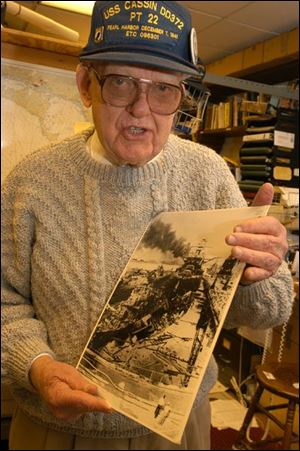
Ranks of survivors dwindle, but lessons of attack remain
12/7/2004
Tom Child, holding a photo of his ship, was a torpedo officer aboard the USS Cassin when the Japanese attacked Pearl Harbor. Mr. Child, of Findlay, is among the survivors who want to remind younger generations of the tragedy.
Tom Child was there when Japanese pilots hurled bombs down on the sleeping naval base in Pearl Harbor.
So were Jim Gilbert and Maurice Alexander.
But the men who survived the devastating attack 63 years ago are becoming fewer in numbers. So few, in fact, that the local chapter of the Pearl Harbor Survivors Association disbanded this year after both the president and vice president passed away.
But the day that led the United States to declare war in December, 1941, will not be forgotten.
It will be remembered for the 2,403 Americans who were killed and for the three massive ships that were reduced to mangled metal at the bottom of the harbor. Nearly 20 others were damaged.
And it will be remembered because people like Mr. Child, 85, of Findlay are willing to share their stories "to anybody who will listen."
"It was very serious business, and there were millions of people working hard to kill an enemy that they didn't know," said Mr. Child, a torpedo officer aboard the destroyer USS Cassin.
It was only decades later, on Sept. 11, 2001, that such a harrowing attack occurred on American soil. It was an attack that once again reminded Americans of Dec. 7, 1941, when the smells of burning oil and the screams of dying sailors filled the early morning air.
Jim Welker, chairman of the Ohio chapter of the Pearl Harbor Survivors Association, said there are only about 150 survivors left statewide. The primary goal of the organization is to keep the memory of Pearl Harbor alive, he said. The second goal is to keep America alert.
"They came in on a Sunday morning. I was sound asleep and the bombs and bullets had awakened me. That was the first I knew that there was a war," said Mr. Welker, 82, of Elida, Ohio.
"At the same moment, they were killing 2,403 of us," he added. "That's a lot, and we didn't know it was going to happen. We do not want people to forget that, especially we do not want people to forget it and allow it to happen again."
Mr. Welker, who was in an Army Air Corps barracks at the time of the attacks, knows that the number of those who were in Pearl Harbor on the day of the attack is dwindling. That's why he and others have spent the last few years working to ensure that it remains known as a "day of infamy."
They have had some success. This year, I-75 from Toledo to Cincinnati was dedicated as Pearl Harbor Memorial Highway, and all state flags will be lowered today per a resolution signed by Gov. Bob Taft.
In Toledo, Jim Gilbert thumbs through a small blue book, the Pearl Harbor Survivors Association membership directory. Inside there are several names crossed out - all the men who have since died. Only six names remain.
Mr. Gilbert, 84, was assigned to the USS MacDonough, a destroyer moored in the harbor on Dec. 7, 1941, but it did not sustain any damage that day. A young naval seaman, Mr. Gilbert said he was on shore that night and awoke to gunfire the next morning.
"I went back to the harbor and down to the landing and saw the horrible thing that happened to our fleet," he said. "Then the next wave of planes went over and we started shooting at them."
The Japanese attacked Pearl Harbor at 7:55 a.m. A second wave of Japanese aircraft struck at 8:45 a.m.
The Americans, docked closely together in the harbor, were "sitting ducks" for the Japanese fighter planes, Mr. Gilbert recalled.
Maurice Alexander, 89, of Findlay spent five years in the Army and found himself on shore when the Japanese attacked.
Mr. Alexander admits that he doesn't have the clearest memory now; he tends to forget some things. Pearl Harbor, however, will not be forgotten, he said.
"It's always there," said Mr. Alexander, pointing to his head. "It's recorded up there."
Contact Erica Blake at:
eblake@theblade.com
or 419-724-6076.